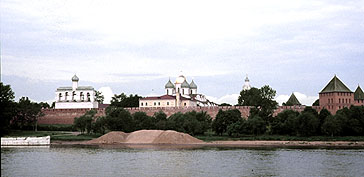Unit 3: Rise of Moscow and the Gathering of the Lands

View of the old kremlin of the city of Lord Novgorod the Great along the Volkov River in northwestern Russia.
- Read the textbook chapters 7, 8, 9, 10, 11, 12, 13 and 14.
- Check the remarks by Professor Blois and Professor Evans on the development of the early Muscovite state.
- Study the Questions to Consider and the Key Terms for the Unit.
- Post (or respond) your thoughts/ideas about this Unit's reading and assignment in the Blackboard online discussion forum. Do not post your assignment there.
- Read the notes by Professor Hammond on the "Mongol Influence on Russia," a very good summary of the pros and cons of the debate over whether the Mongols were "good" or "bad" for Russia. (*.pdf file)
- Read the notes on the Mongol Invasion of Hungary in the thirteenth century. These were done by Maria Grof-Tisza, a student in HIS 111.
- Read chapter 6, chapter 7, chapter 8 and chapter 9 from Mary Platt Parmele (1843-1911) A Short History of Russia (1907, 4th edition). These are short chapters, and this is optional reading.
- Novgorod: The Heart of Medieval Russian Democracy Pines for Tourists
- Москвоведение. Иван III. Tsar Ivan III
- See the videos dealing with the Mongols in the HIS 111 Course.
- For extra credit please suggest to your instructor a relevant video for this unit of the course. Send the title of the video, the url and a brief explanation of why you find the video interesting and applicable to the material that is being studied in this unit.
- For 50 points maximum extra credit, watch Andrei Rublev and write a one-page paper explaining Rublev's place in medieval Russia.
- For 50 points maximum extra credit, watch Aleksandr Nevskii and write a one-page paper making historical connection between 1938 with 1242. Also add some comments about the art of the film.
- For 50 points maximum extra credit, read David Nicolle, et al, Kalka River 1223: Genghiz Khan's Mongols Invade Russia (2002) and write a one-page paper that answers the question, What factors contributed to the Russian defeat by the Mongol forces?
- One of the most famous, surviving pieces of medieval Russian literature is the Song of Prince Igor (various titles); this is also available in a version, excellently translated by Vladimir Nabokov (You can also have a look at the Old Russian original). Finally, I want also to mention Aleksandr Borodin's opera, Prince Igor. The opera was not completed by Borodin before his death, but his friends Nikolai Rimsky-Korsakov and Aleksandr Glazunov finished it; it was first performed in 1890. For 25 points maximum extra credit, read "The Song of Prince Igor" and write a paragraph explaining how the "Song" adds to our understanding of early Russian history.
- For 25 points maximum extra credit, check The Mongols in World History website and write a paragraph that answers the question, What factors allowed the Mongols to construct such a large empire?